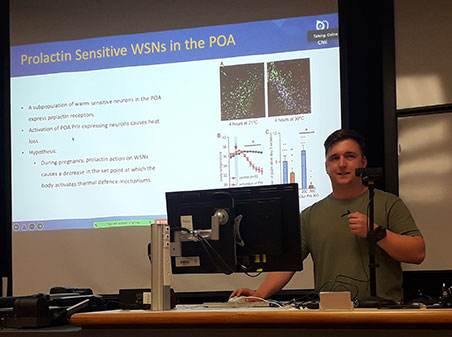While I was in the Royal New Zealand Navy and planning to study, I initially was drawn to Psychology and wanted to become a clinical psychologist. After looking at the universities in New Zealand, I was drawn to Neuroscience. My passion for Neuroendocrinology was established when in my second year, I was diagnosed with a tumor in my pituitary gland that affected my hormones. Within neuroendocrinology, I am particularly interested in metabolism and how hormones control energy balance.

I started my research career with a Summer Scholarship at Otago in 2020 to help characterise a transgenic mouse model used in some work my supervisor had completed previously. This work involved assessing whether the hormone prolactin was involved in changes to the small intestine during pregnancy. After this, I carried on to do an honours project with my supervisor focusing on exercise capacity in pregnancy. This work involved testing the exercise capacity of mice using a treadmill, something quite new to our lab so it was quite an interesting experience. After this, I completed another Summer Scholarship working on our small intestine project again but this time gathering more metabolic data to help bolster our sample size.
My current PhD work focusses on metabolic adaptations that occur during pregnancy, specifically whether prolactin helps mice to adapt to increased heat production. This will involve me assess if/how prolactin impacts hypothalamic circuits that control body temperature, particularly the circuits involved in the loss of heat. This work will involve a wide range of methods including the generation of a transgenic mouse model lacking the receptor for prolactin on neurons responsible for heat loss, RNAscope in situ hybridisation, immunohistochemistry, behavioural assessments, implanted telemetry probes to monitor core temperature during pregnancy, and fibre photometry to monitor the activity of these heat loss neurons when they have/lack prolactin receptors. This work is important as the ability to lose heat during pregnancy is critical for the health of both the mother and children. When factoring in climate change, understanding these circuits could be crucial for implementing therapeutics. Compared to my previous work in the Navy, doing research has proven to be far more rewarding as you can take a project and really make it your own. I would encourage anyone considering research as a career to give it a go!
